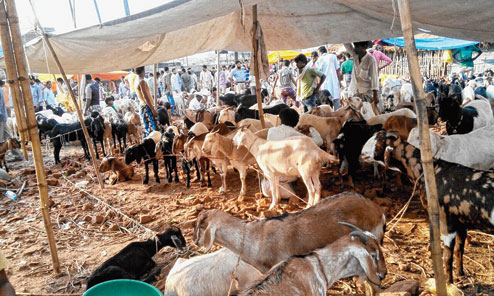 |
| A cattle market in Patna. Telegraph picture |
Buy livestock for sacrifice online if the price at the cattle market is unaffordable.
Hundreds thronged cattle markets on Sunday to choose the best goats to mark the festival of sacrifice. But given the escalating prices, there were others who chose to buy the animals online.
Anwar Hussain, a resident of Boring Road, said: “In comparison to last year, the price is very high this time. I bought three sacrificial animals at Rs 36,000. One of my friends bought two goats online at an affordable rate and seems satisfied. If the price continues to shoot up in this manner, I, too, will go online.”
The online market has become a boon for many goat sellers. They can now easily put up the animals for sale through classified advertisements.”
Javed Ahmad, who sold his cattle on an online platform, said: “With a boom in e-trading, it has become easy for us to sell our goats online. I sold all my cattle and got a fair price for them.”
A huge crowd assembled at the cattle market a day before Id-ul-Zuha — observed on the 10th day of Dhu al-Hijjah (the 12th and final month in the Islamic calendar).
Though most people prefer local breeds from Khagaria, Buxar, Bhagalpur, Jehanabad, Purnea, Ara, Sitamarhi, Saharsa, Gopalganj and Gaya, a variety of breeds such as the Jamunapuri from Allahabad, Barbari from Etawah and Ajmeri from Rajasthan have been brought to the Patna cattle market.
Ajmeri goats, too, are in great demand. The weight of the animal varies between 18kg and 100kg and its price hovers between Rs 10,000 and Rs 1.5 lakh.
“Today is the last day of the bazaar. Many people who live in apartments are buying goats as they have limited options to take care of an animal. Owing to a fast-paced life and other hassles, many residents are not able to take good care of sacrificial animals, so they opt for the local breeds,” said Mohammad Ziya-ul Khan, the co-ordinator of the cattle market at Raja Bazaar. He added: “Some people placed orders for goats, which they would pick up on Monday morning. Many shopkeepers have tied synthetic flowers and bells around the necks of the animals to woo customers.”
“The price of cattle is high because of a delay in the arrival of the goats. Many of the animals did not reach the market on the scheduled time owing to Id and Dussehra being so close. The climatic conditions led to a hike in price. Most customers choose goats looking at their grace, beauty, aggressiveness and strength. Price rise or not, there will always be a demand for these holy animals,” said Imtiyaz, a trader at the cattle market.
Mohammad Yahiya Ansari, a resident of Phulwari, said: “It’s a once-in-a-year affair. No matter how much the goats are priced, we will pay for it. The amount does not matter if the cattle is well nourished and strong.”
There were several others, however, for whom price did play a factor in the purchase of goats. “Generally, I buy three goats for Id-ul-Zuha but this year, owing to the high prices, I bought two for the same amount I used to shell out for three earlier,” said Ashfaque Ahmad, a resident of Patliputra Colony. Many Muslims wear new clothes and attend an open-air prayer meeting during Id-ul-Zuha.
They may sacrifice a sheep or goat and share the meat with family members, neighbours and the poor.
Many Muslims feel they have a duty to ensure that all Muslims enjoy a meat-based meal during this holiday.











